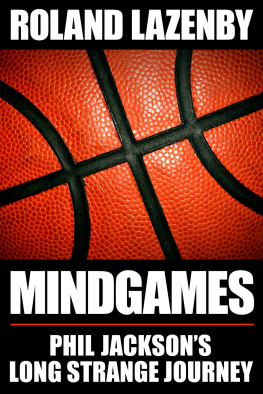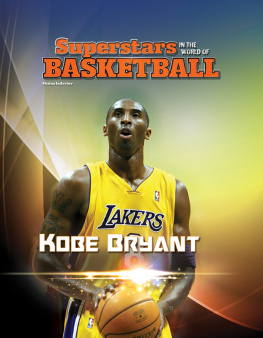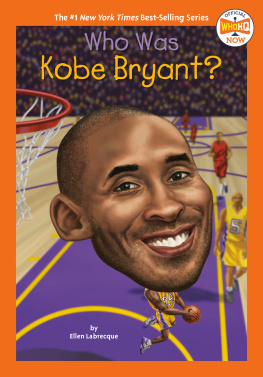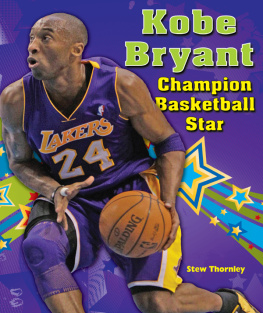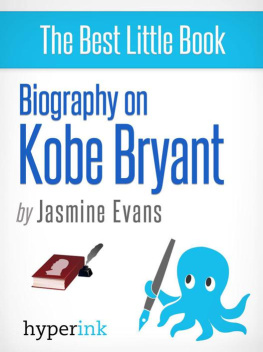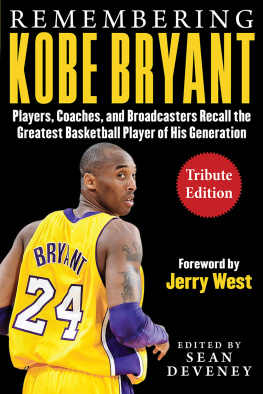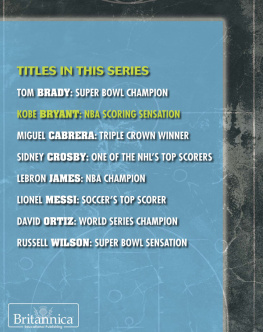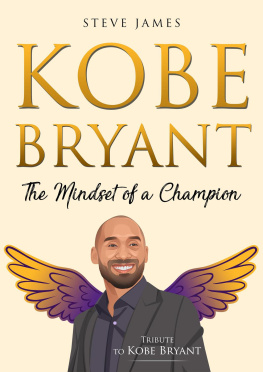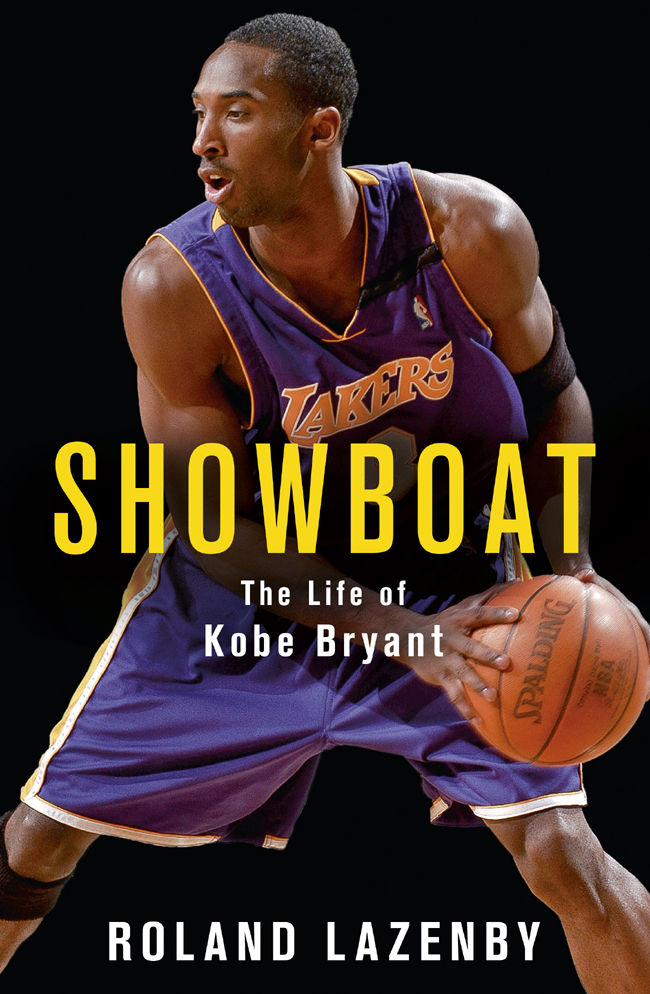SHOWBOAT
The Life of Kobe Bryant
ROLAND LAZENBY

Dedicated to black and white and all the wonderful shades in between, to Ella Mae Austin and to Roger Davis, and to Doc Foster and Estella Hampton, to all of those who bless us by teaching giant lessons in a million precious ways, and to my lovely companion of many years, Karen, who is far beyond measure, to my children, Jenna, Henry, and Morgan, and grandsons, Liam and Aiden.
In loving memory of Jeanie Lazenby Masten.
CONTENTS
I N THE BEGINNING , he came across as a fun-loving kid. He wasnt, of course. Kobe Bean Bryant had to work hard to show that nothing bothered him.
Especially that troubled rookie season.
I was there the night he scored his first NBA field goal, a three-pointer, at Charlotte Coliseum, in December of 1996.
He bounced into the locker room after the game and hit me with a soul shake, a little skin, the hooked fingertips, and a tug. He had no earthly idea who I was. Just some guy with a notepad and a recorder. But he was eager to greet the world.
Later that season, I sat alone with him in an empty locker room in Cleveland, as he waited to compete in the slam dunk contest at the NBAs fiftieth anniversary All-Star Weekend, passing the empty time before he went on stage.
We discussed his status as the poster child for a generation of new talent coming into the NBA, much of it very young, the youngest group of players that would ever come into the league. He talked of the difficulties, the expectations, the hazards, the many temptations in big, bad Los Angeles for a player who was just eighteen years old.
He talked about how deeply Magic Johnsons HIV announcement in 1991 had affected him at age thirteen, about how he would avoid the temptations that Johnson would later admit led him to sleep with three hundred to five hundred people every year.
With me, its simple, Bryant told me, because theres a lot I want to accomplish in my life.
Indeed, just minutes later he would leave our relaxed, thoughtful discourse in the locker room to put on an energetic performance and win the slam dunk contest, which turned up the flame on his already white hot ambition.
The next year he would be voted a starter in the All-Star Game, despite the fact that he didnt even start for the Lakers. That would be followed by the disastrous 1999 season in which Lakers owner Jerry Buss blew up an extremely talented team that seemed to be headed nowhere.
In the midst of the chaos of his third season, Bryant was a very lost, lonely, frustrated twenty-year-old.
I just want to be the man, he told me, reaffirming his goal of making himself into the NBAs top player. I dont know how Im going to get there. I just have to find a way.
And he would, despite how unlikely such a goal seemed at the time. As he closed in on the end of his career in 2016, Bryant could look back at the numbers he racked up in twenty seasons and declare that he had earned a seat at the table with the games greatest. In 2015, he had passed his idol, Michael Jordan, to sit third on the leagues list of all-time scorers, behind only Kareem Abdul-Jabbar and Karl Malone. More important, Bryant had helped lead the Lakers to five NBA titles, made eighteen appearances on the All-Star team, and had won two Olympic gold medals.
Though that night as a rookie in Cleveland he said that he didnt know how he would get to the top, he had settled on an answer he had known all along. He was going to grind his way thereimplacably, relentlessly grind away at the challenges of the game, night after night, game after game, until he found a dominance born of his ability to outwork everyone else.
The events of his careeran unprecedented twenty years with a single NBA teammake the case that Bryant, aloof and uncompromising, brilliant and self-confident, has proved himself to be a grand enigma of American professional basketball. He is easily the most driven competitor in the history of the game, one who over the seasons quietly gained a reputation among the insiders of the sport as an absolute master of study and intense preparation, with a singular focus on detail that astonished those around him. In turn, his life also proved to be a machine that churned out immense conflict, just about all of it the by-product of his push to dominate the sport.
Night after game night, day after day, for two decades, through injury and turmoil, through the rupture of one key relationship after another, there would be no price he would not pay to have his greatness.
In the process, he became what would be described again and again as the most polarizing player in the NBA, alternately loathed and loved by huge portions of the pro basketball fan base.
From the earliest age, his father, former NBA player Joe Jellybean Bryant, had sought to establish in his son a supreme confidence. Above all, it remained his trademark.
That impenetrable, unshakable self-belief was the one trait where Bryant clearly outranked his contemporaries, said psychologist George Mumford, who had worked extensively with both Jordan and Bryant. It puts him in his own category.
The confidence remained in place because Bryant virtually excluded any challenge to it, explained Mumford. He wont allow himself to deal with any contrary view.
It guided Bryant through his early struggles as a teenager in the NBA, through his battles with teammates and coaches, through rape charges in 2003, through his conflicts with and estrangement from his parents, and later through his battle back from serious injuries. It was the backbone of his 81-point game, of his many game-winning shots, of his MVP performances, of his total lack of a conscience about the high volume of shots he could take on a given night. It was largely the reason that Bryant made a regular practice over his career of playing through the sort of pain that put others on the injured list, Mumford said.
That confidence was also responsible for another major storyline in Bryants career, his disconnect with teammate Shaquille ONeal despite their success in leading the Los Angeles Lakers to three straight NBA championships between 2000 and 2002. In so many ways, his relationship with the giant center forged the arc of his competitive journey, one that drew out in Bryant the penchant for conflict that touched just about every phase of his life.
Thus, the title of this book. Showboat was the nickname that ONeal gave Bryant when he was a rookie eager to show off his dunking skills and ability to get to the rim.
Bryant intensely disliked that nickname. He thought it demeaned him as someone lacking competitive integrity, which was a charge that had been frequently leveled at his father over the years, mostly in whispers around professional basketball. Yet the nickname also represents the prodigious love of the game that Bryant shared with his father and their delight in playing it in a flashy, entertaining manner.
My father played basketball, and it has kind of been in my blood since I was a kid, Bryant explained. I loved playing basketball. I played other sports but I never really got that enjoyment that I get playing basketball.
As a child, he spent many hours watching his father show off in the Italian league, where he had retreated after the premature collapse of his pro career in America.
It was fun for me to see how people responded to his moves and his charisma when he was playing, Bryant once told me. I kind of wanted to have that same feeling. Then again it was kind of cool when he was playing. He was Jellybean Bryant.
Sam Rines, his primary Amateur Athletic Union coach, saw the same strong passion in the son as a young teen.


